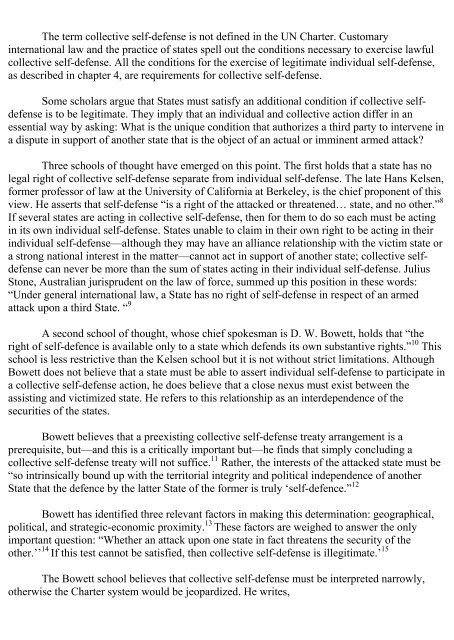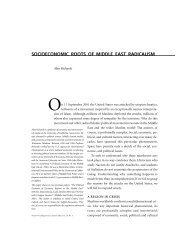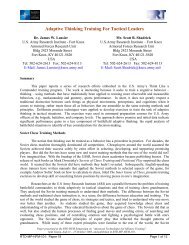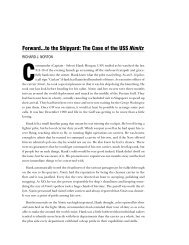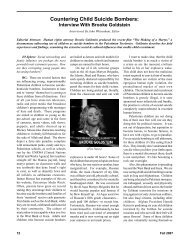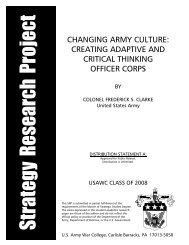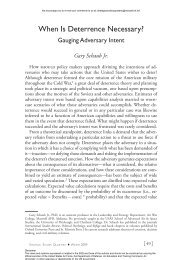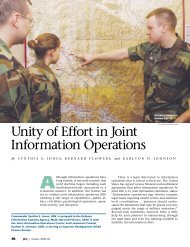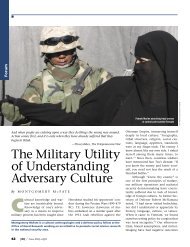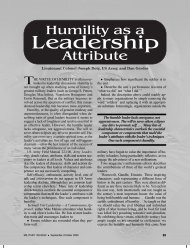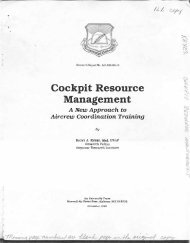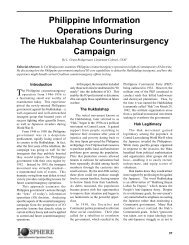Legitimate use of military force against state-sponsored - Air University
Legitimate use of military force against state-sponsored - Air University
Legitimate use of military force against state-sponsored - Air University
You also want an ePaper? Increase the reach of your titles
YUMPU automatically turns print PDFs into web optimized ePapers that Google loves.
The term collective self-defense is not defined in the UN Charter. Customary<br />
international law and the practice <strong>of</strong> <strong>state</strong>s spell out the conditions necessary to exercise lawful<br />
collective self-defense. All the conditions for the exercise <strong>of</strong> legitimate individual self-defense,<br />
as described in chapter 4, are requirements for collective self-defense.<br />
Some scholars argue that States must satisfy an additional condition if collective selfdefense<br />
is to be legitimate. They imply that an individual and collective action differ in an<br />
essential way by asking: What is the unique condition that authorizes a third party to intervene in<br />
a dispute in support <strong>of</strong> another <strong>state</strong> that is the object <strong>of</strong> an actual or imminent armed attack?<br />
Three schools <strong>of</strong> thought have emerged on this point. The first holds that a <strong>state</strong> has no<br />
legal right <strong>of</strong> collective self-defense separate from individual self-defense. The late Hans Kelsen,<br />
former pr<strong>of</strong>essor <strong>of</strong> law at the <strong>University</strong> <strong>of</strong> California at Berkeley, is the chief proponent <strong>of</strong> this<br />
view. He asserts that self-defense “is a right <strong>of</strong> the attacked or threatened… <strong>state</strong>, and no other.” 8<br />
If several <strong>state</strong>s are acting in collective self-defense, then for them to do so each must be acting<br />
in its own individual self-defense. States unable to claim in their own right to be acting in their<br />
individual self-defense—although they may have an alliance relationship with the victim <strong>state</strong> or<br />
a strong national interest in the matter—cannot act in support <strong>of</strong> another <strong>state</strong>; collective selfdefense<br />
can never be more than the sum <strong>of</strong> <strong>state</strong>s acting in their individual self-defense. Julius<br />
Stone, Australian jurisprudent on the law <strong>of</strong> <strong>force</strong>, summed up this position in these words:<br />
“Under general international law, a State has no right <strong>of</strong> self-defense in respect <strong>of</strong> an armed<br />
attack upon a third State. “ 9<br />
A second school <strong>of</strong> thought, whose chief spokesman is D. W. Bowett, holds that “the<br />
right <strong>of</strong> self-defence is available only to a <strong>state</strong> which defends its own substantive rights.” 10 This<br />
school is less restrictive than the Kelsen school but it is not without strict limitations. Although<br />
Bowett does not believe that a <strong>state</strong> must be able to assert individual self-defense to participate in<br />
a collective self-defense action, he does believe that a close nexus must exist between the<br />
assisting and victimized <strong>state</strong>. He refers to this relationship as an interdependence <strong>of</strong> the<br />
securities <strong>of</strong> the <strong>state</strong>s.<br />
Bowett believes that a preexisting collective self-defense treaty arrangement is a<br />
prerequisite, but—and this is a critically important but—he finds that simply concluding a<br />
collective self-defense treaty will not suffice. 11 Rather, the interests <strong>of</strong> the attacked <strong>state</strong> must be<br />
“so intrinsically bound up with the territorial integrity and political independence <strong>of</strong> another<br />
State that the defence by the latter State <strong>of</strong> the former is truly ‘self-defence.” 12<br />
Bowett has identified three relevant factors in making this determination: geographical,<br />
political, and strategic-economic proximity. 13 These factors are weighed to answer the only<br />
important question: “Whether an attack upon one <strong>state</strong> in fact threatens the security <strong>of</strong> the<br />
other.’’ 14 If this test cannot be satisfied, then collective self-defense is illegitimate.’ 15<br />
The Bowett school believes that collective self-defense must be interpreted narrowly,<br />
otherwise the Charter system would be jeopardized. He writes,


